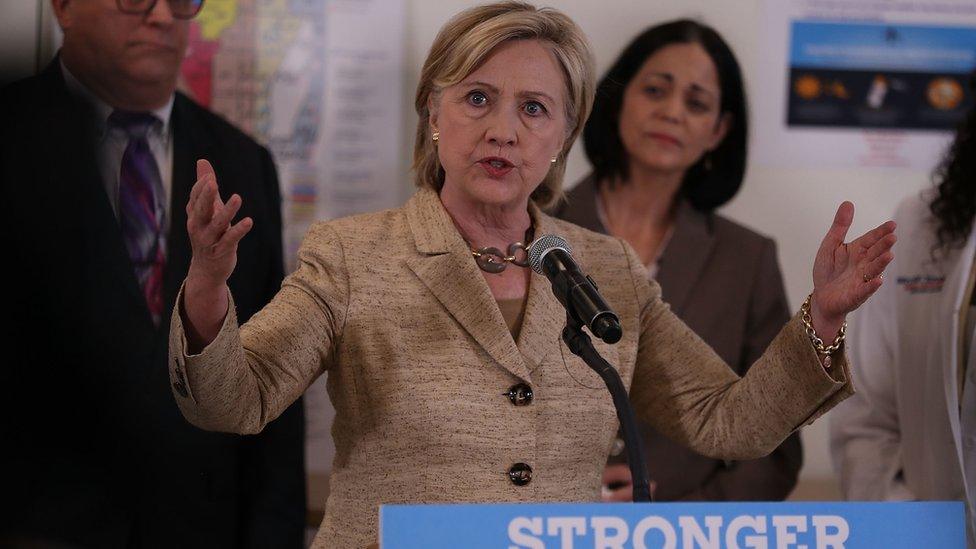US election: Why is Clinton's foundation so controversial?
- Published
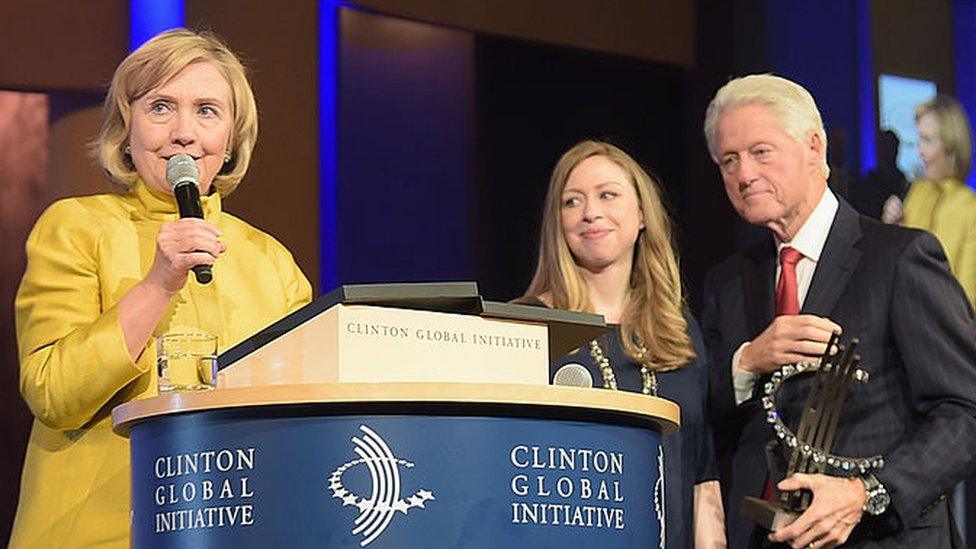
The Clinton Foundation's value is in the eye of the beholder. It has been lauded as force for good in the world. It has also been condemned as a "slush fund" for the Clinton family and a front for official corruption. Either way, it has become a growing source of discomfort for a Hillary Clinton presidential campaign that would much rather have voters and the media focus on Donald Trump and his finances.

So what is the Clinton Foundation, anyway?
The Bill, Hillary and Chelsea Clinton Foundation is an international charitable organisation founded in 1997, originally to establish the Bill Clinton presidential library.
Unlike personally endowed "private foundations" that serve as a pass-through for donations to other groups that do the on-the-ground work, the Clinton Foundation is an "operating foundation" - which means it primarily conducts its own charitable activities.
The organisation's goal, as stated on its website, external, is decidedly grand: "We build partnerships between businesses, NGOs, governments, and individuals everywhere to work faster, leaner and better; to find solutions that last; and to transform lives and communities from what they are today to what they can be, tomorrow."
The foundation has 11 major programmes focusing on agriculture in Africa, combating childhood obesity, economic development in South America, earthquake relief in Haiti, reducing the cost of Aids drugs and mitigating climate change.
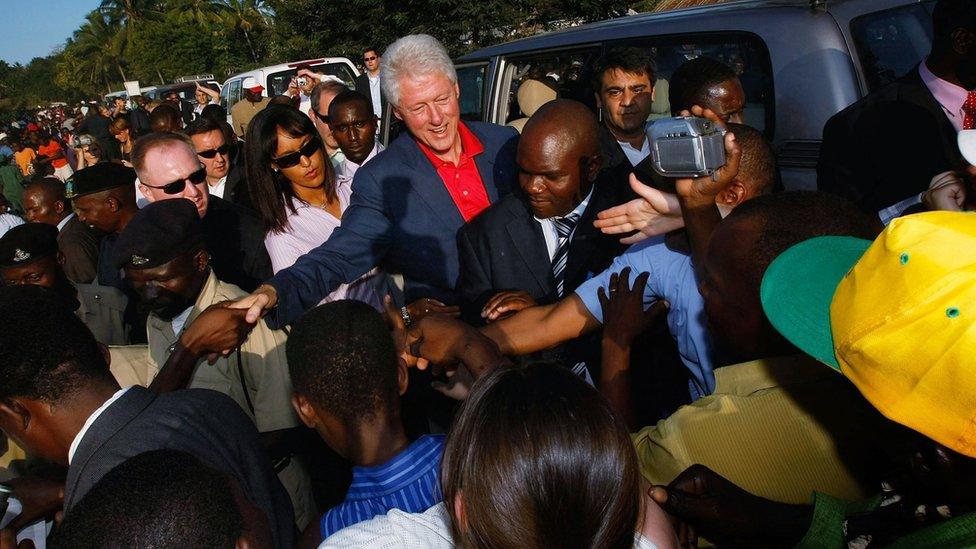
The foundation's work on HIV took Bill Clinton to Tanzania in 2007
It also operates the Clinton Global Initiative, an annual gathering of political leaders, business executives, non-profit officials and celebrities that discuss solutions to international problems.
The foundation reports that it has raised $2bn (£1.5bn), employs more than 2,000 workers and maintains an annual budget of more than $223m (£170m).
The rating group Charity Watch, external gives the Clinton Foundation an "A" and reports that 88% of the money the foundation brings in goes to its programmes, with the rest spent on overheads - surpassing the benchmark for reputable charity groups.
In an extensive profile, external, the Washington Post details the rather unorthodox way the foundation evolved into its current sprawling, multibillion-dollar form.
"It was not designed as a master plan but rather has grown, one brainstorm at a time, in accordance with the ambitious, loyal, restless and often scattered nature of its primary namesake," the Post reporters write. "Many programs were sparked by chance encounters in Bill Clinton's life."
They describe Mr Clinton as a "convener who wrangles rich people's money for poor people's problems".

Who are these "rich people" donors?
The Clinton Foundation's list of donors who have given more than a million dollars is a hodgepodge of international aid organisations, national governments, corporations and wealthy international elites.
There's the usual collection of prominent charitable groups, such as the Bill and Melinda Gates Foundation, the Children's Investment Fund, the Rockefeller Foundation and the Pritzker Family Foundation.
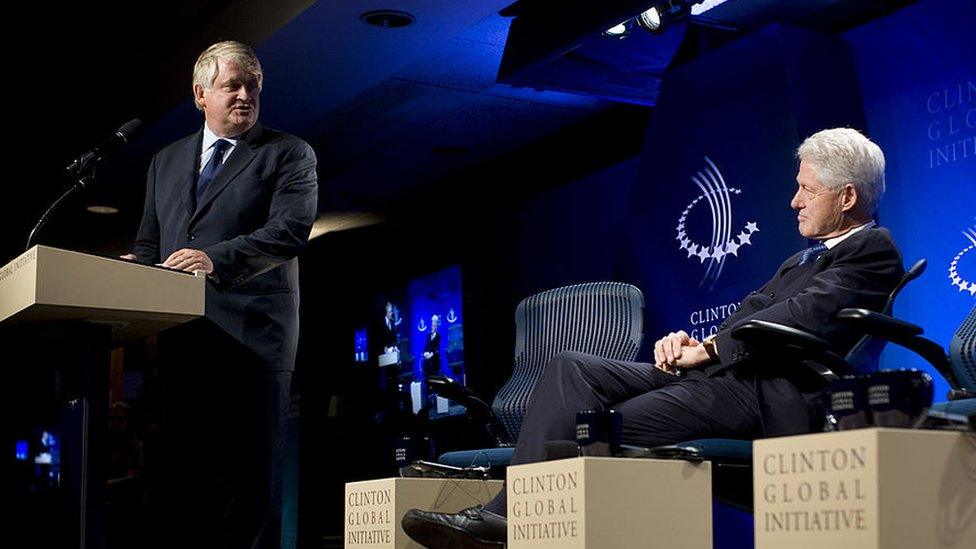
Digicel head Denis O'Brien has contributed more than $10m to the Clinton Foundation
The contributor roll also includes some heavy-hitting FOBs (friends of Bill, as they're often called) with a decided entertainment-industry tilt, such as American media mogul Fred Eychaner, Ukrainian steel executive Victor Pinchuk, Irish communications billionaire Denis O'Brien and Egyptian-born investor Haim Saban.
Canadian mining entrepreneur and film-producer Frank Giustra has contributed more than $100m to the foundation's various enterprises and is on its board of directors.
The governments of the Netherlands, Kuwait, Norway, Australia and Saudi Arabia also are big-money donors, as are the companies ExxonMobil, Cisco, Booz Allen Hamilton, Anheuser-Busch, Coca-Cola, Barclays bank and TracFone Wireless.
All in all, more than half of the million-dollar-plus contributors are from outside the US.

Why has the foundation been controversial?
An organisation that brings in billions of dollars in donations from around the world and is operated by an ex-president and a possible future president who served at a high level in another presidency creates all sorts of possible conflicts of interest.
It's something the Obama White House was keenly aware of when it vetted Mrs Clinton for the secretary of state job in 2009. Before she was offered the Cabinet-level position White House adviser Valerie Jarrett negotiated an ethics agreement with Bruce Linsey, then the head of the Clinton Foundation, that set out a separation between the charity organisation and the State Department.
Mrs Clinton signed a document, external in which she promised to remove herself from participation in any matter that could have a "direct and predictable effect" on the foundation unless she had a written waiver from the administration.
Despite these paper pledges, Clinton critics assert that the foundation created the possibility that donors could unduly influence Mrs Clinton's official actions and provide individuals with special access to her.

What kind of actions or access are we talking about?
The 2015 book Clinton Cash by Peter Schweizer laid out numerous examples of Clinton Foundation donations that were followed by State Department actions that were favourable to the donor.
The New York Times, in an April 2015 article, took a detailed look at one such instance.
In 2010 the State Department approved a move by the Russian state-owned company Rosatom to purchase a Canadian mining company with uranium mineral rights on US soil after a bank with ties to the Russian company paid Mr Clinton $500,000 for a speaking engagement in Moscow. The Canadian company in question was founded by million-dollar foundation donor Frank Giustra.
The Clinton campaign has been quick to point out that the State Department wasn't the only US government agency that had to sign off on the deal and that there was no evidence that Mrs Clinton did anything improper.
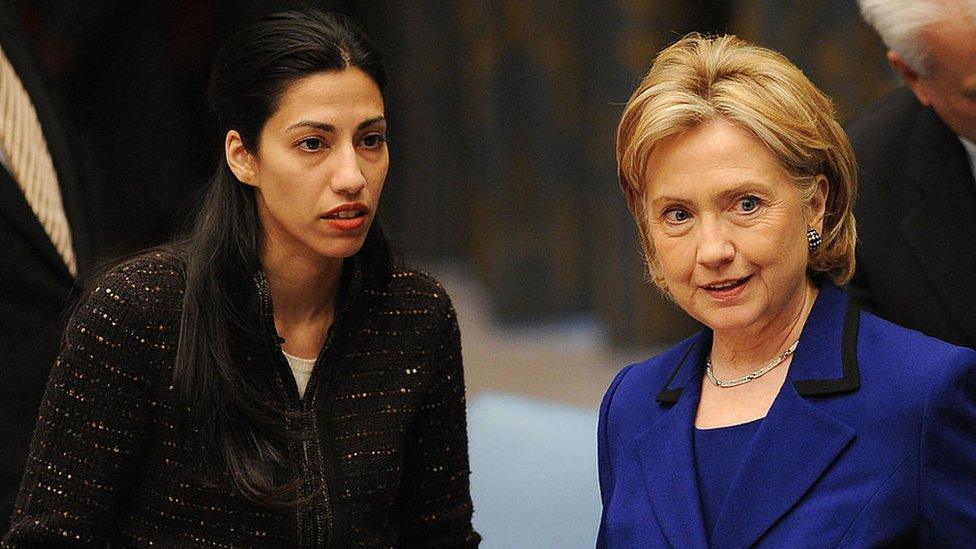
Huma Abedin was in regular email communication with Clinton Foundation officials
There have been no clear quid-pro-quo connections found in any of Schweizer's list of alleged transgressions.
Questions about special access for donors surfaced in August 2016, when emails on the private server Mrs Clinton maintained while secretary of state revealed that the firewall between the foundation and State Department wasn't always impregnable.
For instance, foundation executive Doug Band contacted top Clinton State Department official Huma Abedin - who also was also paid as an independent contractor by the foundation - about arranging special government meetings for donors such as Crown Prince Salman of Bahrain, weight-loss drink executive S Daniel Abraham and Lebanese-Nigerian Gilbert Chagoury.
"We need Gilbert Chagoury to speak to the substance person re Lebanon," Band wrote to Abedin and Clinton aide Cheryl Mills in one email. "As you know, he's a key guy there and to us and is loved in Lebanon. Very imp[ortant]."
Clinton campaign officials have said that many of the meetings never happened and, in any event, Mrs Clinton never took actions based on contributions to the foundation.
That hasn't stopped another round of questions about the foundation, however.
"The Clintons' cosy relationship with their foundation's global patrons was a problem when Hillary was secretary of state and it is a problem now that she's running for president," writes, external Slate's Josh Vorhees.
Kevin Drum of the liberal Mother Jones magazine is unimpressed, external, however, saying Mrs Clinton ran the department with "a surprisingly high level of integrity".
"Lots of people talked to Huma Abedin to try to set up meetings with Hillary Clinton," he writes. "Generally speaking, Abedin treated them politely but told them to get lost. That's about it."
On 23 August, the Associated Press reported, external that during the first two years of Mrs Clinton's tenure as secretary of state, more than half the non-governmental, non-foreign individuals Mrs Clinton had official meetings or phone calls with were donors to the Clinton Foundation.
"The frequency of the overlaps shows the intermingling of access and donations, and fuels perceptions that giving the foundation money was a price of admission for face time with Clinton," Stephen Braun and Eileen Sullivan write.
The Clinton campaign called the AP report "outrageous" and that Mrs Clinton had around 1,700 meetings in her first two years in office, of which only 85 were with foundation donors - some of whom were Nobel Prize laureates and leaders of major charity groups, like Melinda Gates.
There have been enough doubts raised about the nature of the ties between the foundation and the State Department, however, that the Federal Bureau of Investigation considered opening a public corruption investigation into the matter.

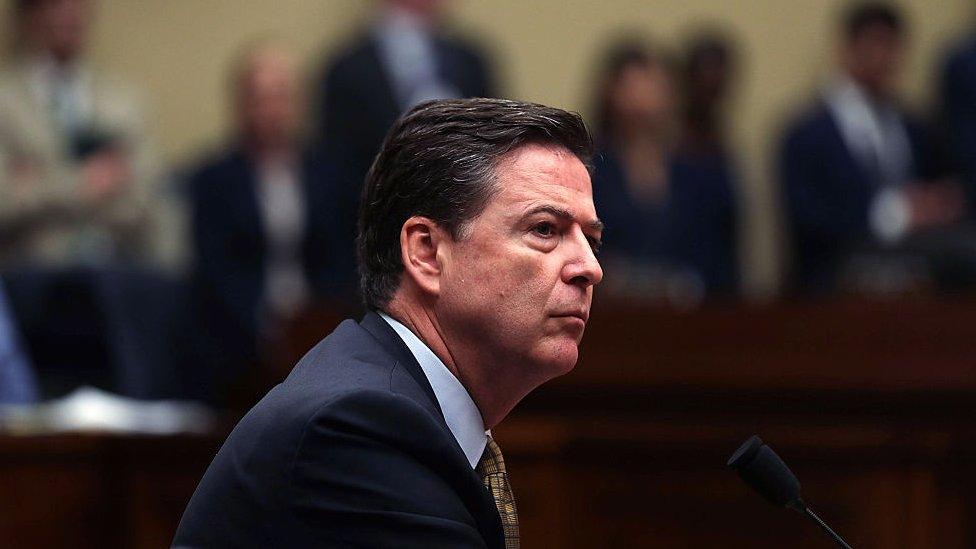
FBI Director James Comey has refused to comment on whether there is an investigation into the Clinton Foundation.
Why didn't the FBI investigate the foundation?
According to press reports, external, earlier in 2016 three FBI field offices recommended launching a formal probe into the possibility of criminal conflict of interest between the foundation and the State Department after a bank informed the bureau of "suspicious activity" by an unnamed foreigner who gave money to the foundation.
The Justice Department, which had conducted its own review of allegations made in Schweizer's Clinton Cash book, reportedly told the FBI that it concluded there were no grounds for a formal investigation.
Clinton defended her email use in March 2015
According to conservative writer Noah Rothman of Commentary magazine, it is "almost impossible to divorce the Obama Justice Department's transparently political handling of the Clinton email saga with its transparently political handling of the Clinton Foundation woes".
There are some reports, external in conservative media that the federal attorneys are conducting a separate investigation into the Clinton foundation, although there has been no confirmation from any of the parties involved.
Clinton campaign spokesman Brian Fallon has called, external these stories "baseless".

The Clinton campaign isn't concerned?
Even as the Clinton team denies the various allegations and rumours swirling around the Clinton Foundation, it has taken some concrete steps to try to defuse the situation.
On 18 August, Mr Clinton announced that the foundation would no longer accept foreign or corporate donations if Mrs Clinton were to be elected president. In addition he said he would stop giving paid speeches for the duration of the campaign, end the annual Clinton Global Initiative meetings and step down from the organisation's board of directors during his wife's time in the White House.
The move doesn't apply to the Clinton Health Access Initiative, which works to lower the cost of Aids drugs in developing nations. It has a separate board of directors and will consider a similar move at a later date.
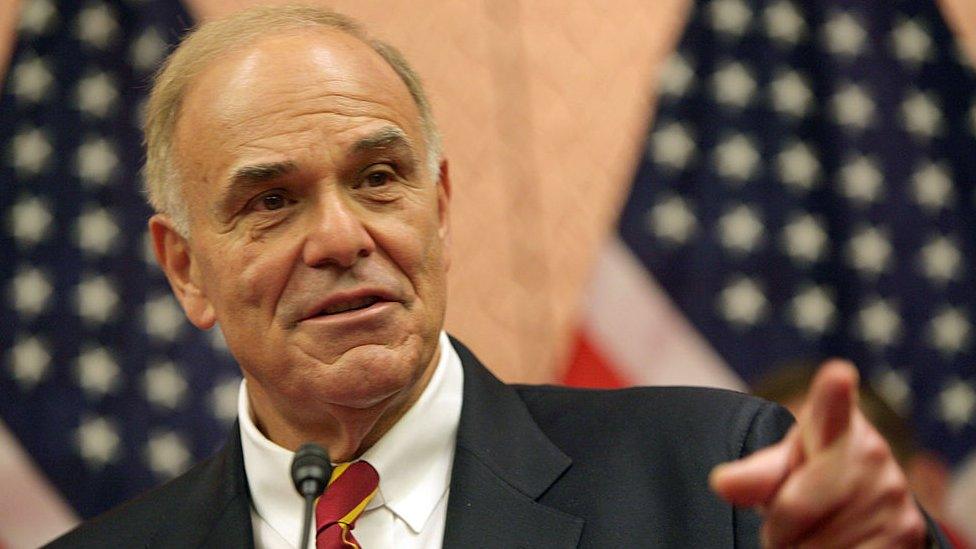
Former Pennsylvania Governor Ed Rendell thinks the Clinton Foundation should be shuttered
Mr Clinton's announced steps may not be enough to assuage concerns about the possibility of conflicts of interest, however.
Earlier in the week the Boston Globe's editorial board urged, external the foundation to stop accepting donations of any kind for the remainder of the campaign and shut down entirely if Mrs Clinton is elected president.
"If the foundation's donors are truly motivated by altruism, and not by the lure of access to the Clintons, then surely they can find other ways to support the foundation's goals," the editors write. "And in four or eight years, the Clinton family could always form a new foundation and re-establish their charitable efforts."
New York magazine's Jonathan Chait echoed this call, external, writing that the foundation is "hardly a large or unique source of corruption", but is "a source of grubby, low-level access headaches".
Former Pennsylvania Governor Ed Rendell, who served as chair of the Democratic National Committee during the last year of Mr Clinton's presidency, said, external it would be "impossible to keep the foundation open without at least the appearance of a problem".
In June Mr Clinton said, external that the foundation would make "some changes" if his wife were elected president, but "we'll just have to cross that bridge when we come to it".
Given the level of uproar, however, the bridge may be underfoot.

So what does Donald Trump have to say about all this?
Unsurprisingly, the Republican nominee isn't holding back when it comes to lobbing charges of criminality against his Democratic opponent. He has repeatedly called the Clinton Foundation a "pay to play" scheme that allowed Mrs Clinton to influence-peddle while at the State Department.
At a rally on 22 August Mr Trump called for, external a special prosecutor to investigate the Clinton Foundation, adding that the Justice Department and the FBI can't be trusted to "quickly or impartially investigate Hillary Clinton's new crimes".
Earlier that day, the campaign released a statement, external calling for the foundation to be shut down immediately.
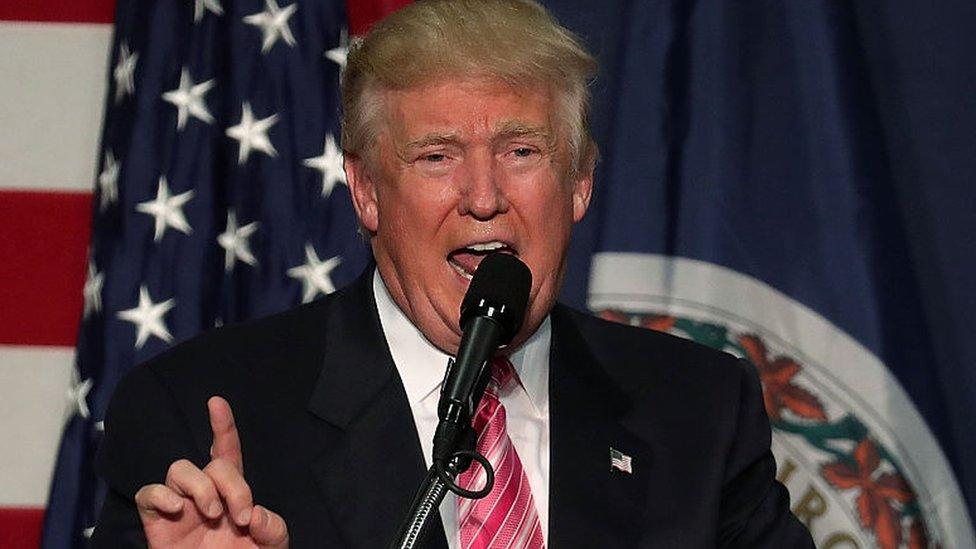
Donald Trump is calling for an independent investigation into the Clinton Foundation
"It is now clear that the Clinton Foundation is the most corrupt enterprise in political history," Mr Trump said in the release. "What they were doing during crooked Hillary's time as secretary of state was wrong then, and it is wrong now."
The swirls of controversy around the Clinton Foundation have given Mr Trump and his campaign surrogates the opportunity to go on the attack against Mrs Clinton after weeks of unforced errors and sinking poll numbers.
Mrs Clinton already suffers from negative ratings for her honesty and integrity in opinion surveys, so many Americans may be predisposed to believe the allegations of improper behaviour while secretary of state are valid.
Mr Trump has serious favourability issues of his own, of course, but it seems like the strategy for the duration of the campaign will be to try to drag Mrs Clinton down as low as possible - and his campaign seems convinced the foundation is a key point of weakness.
Clarification 26 August 2016: We have been asked to make clear that the Crown Prince of Bahrain is not a donor to the Clinton Foundation or the Clinton Global Initiative and that requests for a meeting were also made through official channels.
- Published6 November 2016
- Published22 June 2016
- Published10 August 2016
